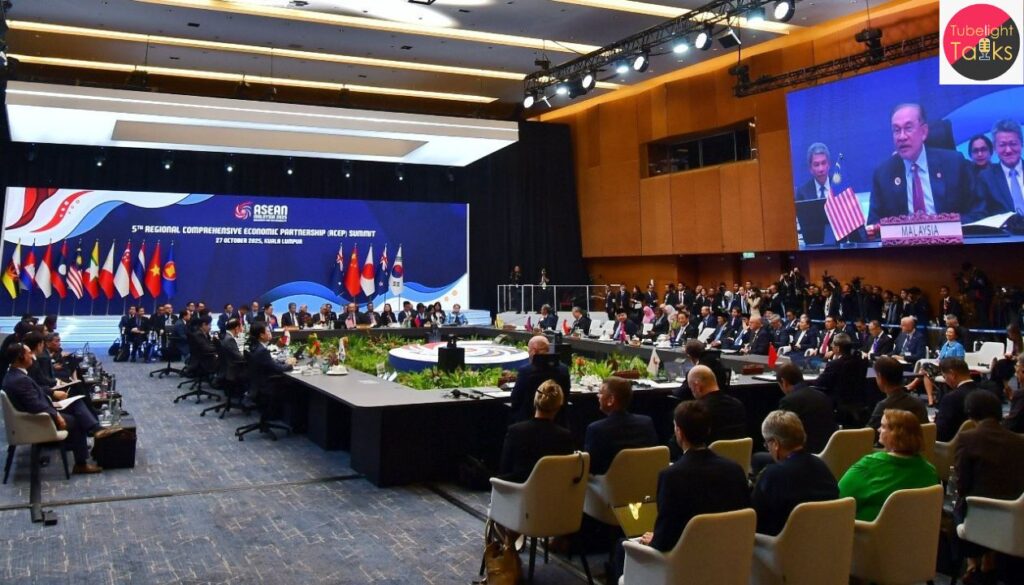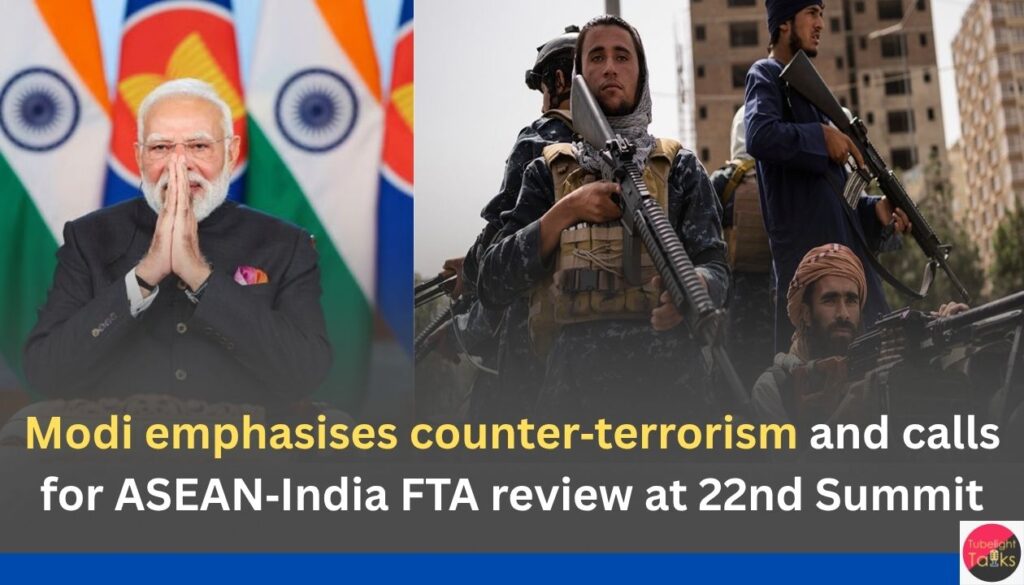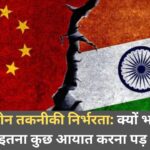Modi emphasises counter terrorism: Indian Prime Minister Narendra Modi, participating virtually in the 22nd ASEAN‑India Summit hosted from Kuala Lumpur, placed renewed emphasis on four key pillars of India‑ASEAN engagement: counter‑terrorism, early review of the ASEAN‑India Free Trade Agreement (FTA), maritime security and inclusive growth.
Modi argued that terrorism remains “a serious challenge to global peace and security” and stressed the imperative of unified cooperation among ASEAN and India to address cross‑border threats and financing networks.
On trade, Modi asserted that an early review of the ASEAN‑India FTA would “unleash the full economic potential of our relationship for the benefit of our peoples and further strengthen regional cooperation.”
The address came as India and ASEAN seek to deepen their Comprehensive Strategic Partnership, align maritime initiatives and promote the “Act East” policy in a region increasingly shaped by big‑power rivalry.
Context and Significance
Summit Framework and India‑ASEAN Relations
India’s engagement with ASEAN has evolved under the “Act East” policy, shifting from declarative outreach to actionable cooperation in trade, connectivity and security.
The 22nd ASEAN‑India Summit provided a platform to review progress, reaffirm commitments and raise new strategic priorities amid rapidly shifting Indo‑Pacific dynamics.
Why the FTA Review Matters
The existing ASEAN‑India Free Trade Agreement (often referred to as AITIGA) is seen by Indian authorities as outdated, prompting repeated calls for revision to reflect modern trade realities.
Modi’s call for an “early review” signals India’s intent to ensure the trade framework is more balanced, responsive to Indian industry concerns and aligned with global standards.
Key Issues Raised by Modi
Counter‑Terrorism and Regional Security
Modi emphasised the need for collective action against terrorism, calling on ASEAN members to strengthen intelligence‑sharing, disrupt terror financing and enhance regional security cooperation.
He further noted India’s readiness to act as a “first responder” in regional crises, and highlighted cooperation in disaster preparedness, humanitarian assistance and training as part of broader security architecture.
Trade and Economic Integration
Modi’s push for early review of the FTA was coupled with proposals to deepen trade, investment and connectivity with ASEAN. He stressed that trade frameworks must benefit all peoples and align with inclusivity and sustainability themes.
Maritime and Indo‑Pacific Focus
In addition to trade and security, Modi declared 2026 as the “ASEAN‑India Year of Maritime Cooperation,” emphasising blue‑economy, sea‑lane connectivity and regional maritime exercises.
The focus on the maritime domain reflects growing attention to the Indo‑Pacific maritime theatre, sea‑lane security, and regional balance of power.
Implications for India and ASEAN
Strategic Partnership Enhanced
Modi’s remarks deepen India‑ASEAN ties beyond economic cooperation, underscoring strategic alignment in security and connectivity.

Economic Leverage and Trade Prospects
An FTA review could lead to revised tariff schedules, updated market‑access rules and increased Indian exports to ASEAN states. This could boost bilateral trade and investment flows.
Regional Stability and Indo‑Pacific Relevance
By linking counter‑terrorism and maritime cooperation with the ASEAN‑India partnership, India positions itself as a credible regional actor in Southeast Asia and the broader Indo‑Pacific.
Also Read: 47th ASEAN Summit in Malaysia: East Timor Joins, Geopolitics, Trade & Neutrality Challenge
Challenges and Next Steps
Complex FTA Revision Process
Revising an existing trade treaty involves negotiations with ten ASEAN member states, careful balancing of interests and institutional alignment—a time‑consuming process.
Ensuring Implementation of Security Commitments
While statements matter, the effectiveness of counter‑terror cooperation depends on concrete mechanisms, resources and sustained coordination.
Managing Geopolitical Pressures
The shift toward maritime and security themes engages India in the Indo‑Pacific dynamic, which includes major powers such as China and the United States. Navigating these pressures without strain on ASEAN‑India ties will require strategic finesse.
Partnership and Purpose
From the teachings of Sant Rampal Ji Maharaj and the notion of satgyan (true knowledge), global diplomacy is not solely about strategic advantage or trade volumes—but about mutual respect, upliftment and shared welfare. When nations collaborate to counter terrorism, modernise trade frameworks and ensure maritime safety, true progress occurs when these actions serve communities, sustain values and elevate human dignity. India’s call at the summit thus reflects a deeper aspiration: not just to transact, but to transform.
Looking Ahead
FTA Review Timeline and Negotiations
Stakeholders will watch when India formally initiates the review process of the ASEAN‑India FTA, the issues tabled and how quickly consensus is reached.
Maritime Cooperation Initiatives
In 2026 and beyond, follow‑up on maritime drills, blue‑economy projects and infrastructure connectivity will signal how the “Year of Maritime Cooperation” is implemented.
Security and Trade Convergence
It will be critical to see how counter‑terror, trade, connectivity and sustainability are integrated into actionable projects rather than stand‑alone announcements.
FAQs: Modi at 22nd ASEAN‑India Summit
Q1. What major issues did PM Modi raise at the summit?
Modi emphasised counter‑terrorism, an early review of the ASEAN‑India FTA, maritime security and deeper India‑ASEAN cooperation.
Q2. Why does India want to review the ASEAN‑India FTA?
India believes the current trade framework is outdated, limiting economic benefits, and aims to make it more equitable, modern and aligned with India’s industry needs.
Q3. What does India propose for maritime cooperation?
India announced 2026 as the “ASEAN‑India Year of Maritime Cooperation,” planning naval drills, blue‑economy partnerships, and enhanced sea‑lane connectivity.
Q4. How does this summit fit into India’s Act East policy?
The summit reinforces India’s Act East strategy by turning rhetoric into strategic output—enhancing trade, security and connectivity with Southeast Asia.
Q5. What are the challenges ahead in the India‑ASEAN agenda?
Key challenges include aligning diverse ASEAN member‑states on trade revision, turning security talk into action, and managing Indo‑Pacific strategic pressures.








![World Bicycle Day 2022 [Hindi] जानिए साइकिल चलाने के लाजबाव फायदे](https://tubelighttalks.com/wp-content/uploads/2021/06/World-Bicycle-Day-2022-Hindi-जानिए-साइकिल-चलाने-के-लाजबाव-फायदे-1-150x150.jpg)


Discussion (0)